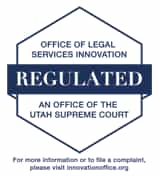
Salt Lake City Trust Attorneys
Helping You Plan for the Future
At Pearson Butler, our Salt Lake City trust lawyers are here to help you plan for the future by preparing an estate plan fit for your wishes and interests, which might include one or more trusts. You might have many decisions to make when creating a trust, but we’re here to guide you through each. Just as so many others in Utah have before, you can rely on our knowledge and experience when making, reviewing, or updating a trust.
A few reasons why so many people in Utah trust us with their trust cases include:
- 30+ attorneys who can work together on complex cases
- 300+ years of total practice experience
- Dozens of support staff to empower our attorneys and clients alike
When made correctly, a trust can be a great legal tool to help you control, protect, and eventually distribute your assets to loved ones, as well as designate certain responsibilities. But when it is made incorrectly, it can cause headaches and costs instead. Get all the legal help you need to confidently make a trust that fits your estate plan and goals by coming to our firm today.
For more information, call our Salt Lake City trust lawyers at (800) 265-2314 and schedule an initial consultation.
What is a Trust?
A trust is a legal document that arranges for a third party, known as the trustee, to hold, control, and monitor assets on behalf of a beneficiary or beneficiaries. The person who creates the trust is known as the grantor.
Trusts can be used to hold a wide range of assets, including real estate, bank accounts, investments, and more. The trustee is responsible for managing the assets in the trust and distributing them to the beneficiaries according to the terms of the trust.
At Pearson Butler, we have the resources, experience, and knowledge to help grantors and trustees alike with trust cases. You can come to us if you have any questions or concerns about any type of trust.
Several different types of trusts include:
- Revocable Living Trust: Allows the settlor to retain control of the assets during their lifetime. It can be modified or revoked by the settlor.
- Irrevocable Trust: Cannot be easily altered or revoked once established. It provides potential tax advantages and asset protection.
- Testamentary Trust: Created through a person's will and only takes effect upon their death. Allows for the distribution of assets to beneficiaries according to the terms specified in the will.
- Charitable Remainder Trust: Provides income to the beneficiary for a specified period, after which the remaining assets go to a charitable organization.
- Charitable Lead Trust: Provides income to a charitable organization for a specific period, after which the remaining assets go to non-charitable beneficiaries.
- Special Needs Trust: Created to provide for people with disabilities without affecting their eligibility for government benefits.
- Asset Protection Trust: Designed to protect assets from creditors and legal judgments.
- Family Limited Partnership (FLP) and Family Limited Liability Company (LLC): Business entities that can be used as part of an estate plan to transfer and manage family assets.
- Qualified Personal Residence Trust (QPRT): Allows a person to transfer their primary residence or vacation home to an irrevocable trust while retaining the right to live in it for a specified period.
- Dynasty Trust: Designed to pass wealth from generation to generation while minimizing estate taxes.
Each type of trust has its own unique benefits and drawbacks. Our Salt Lake City trust attorneys can help you determine which type of trust is right for you and your family.
Why Should You Create a Trust?
A well-made trust can offer various benefits depending on your specific goals and circumstances. Using the wrong trust or making one incorrectly can cause some problems, though. If you think a trust would be a good fit for your estate plan, you should first talk to us about how the trust you had in mind might benefit you. If we think a different trust or no trust at all would work better for your situation, we will let you know. Honesty and transparency are two important principles of ours at Pearson Butler.
Potential advantages of establishing a trust include:
- Probate Avoidance: One common benefit of a trust is that it can help your estate avoid probate. Probate can be a time-consuming and costly process, and a trust allows for the efficient transfer of assets to beneficiaries without court involvement.
- Privacy: Probate proceedings are public record, exposing your assets and distribution plans. A trust, on the other hand, provides a level of privacy as the details of your estate plan are not part of the public record.
- Flexibility: Trusts offer greater flexibility in managing and distributing assets. You can customize the terms of the trust to meet your specific wishes and address the unique needs of your beneficiaries.
- Asset Protection: Certain types of trusts, such as irrevocable trusts, can provide a level of asset protection. These trusts can shield assets from creditors and legal judgments.
- Tax Planning: Trusts can be used for effective tax planning. Depending on the type of trust and the specific provisions, you may be able to minimize estate taxes and provide for tax-efficient wealth transfer to beneficiaries.
- Continuity of Management: Trusts allow for the seamless management of assets in the event of the settlor's incapacity or death. The appointed trustee can step in to manage the trust without the need for court intervention.
- Special Needs Planning: Special Needs Trusts in Utah can be established to provide for individuals with disabilities without jeopardizing their eligibility for government assistance programs.
- Family Wealth Preservation: Dynasty trusts can be set up to preserve family wealth and provide for future generations, allowing assets to pass down without being subject to estate taxes at each generation.
- Smooth Succession Planning: Family Limited Partnerships (FLPs) or Family Limited Liability Companies (LLCs) can be used within a trust structure for smooth succession planning, particularly in family businesses.
Utah Trust FAQs
Do I still need a will if I have a trust in Salt Lake City?
Yes. A "pour-over will" is commonly used with a trust to transfer any assets not already in the trust at the time of your death. It ensures your entire estate is handled according to your wishes.
Is probate required if I have a trust in Utah?
If all assets are properly transferred into the trust, probate can usually be avoided. However, if assets are left out of the trust, those may still go through probate unless otherwise designated (e.g., via a beneficiary form).
How do I fund my trust in Utah?
Funding a trust involves retitling assets (like real estate, bank accounts, investments) in the name of the trust. This step is crucial — a trust with no assets in it provides no benefit.
Can a trust help with Medicaid planning in Utah?
Yes, irrevocable trusts can be part of a Medicaid planning strategy to help protect assets while still qualifying for benefits. However, this requires careful planning due to the five-year lookback period.
Who can serve as a trustee in Utah?
Anyone over 18 who is legally competent can serve as a trustee, including the grantor (for revocable trusts). Corporate trustees, like banks or trust companies, are also an option and may be ideal for larger or more complex estates.
How much does it cost to set up a trust in Salt Lake City?
The cost varies depending on the complexity of the trust and whether you use an attorney. Simple revocable living trusts can cost anywhere from $1,500 to $3,000, while more complex trusts may cost more.
Can a trust be contested in Utah?
Yes, but it is generally harder to contest a trust than a will. Grounds for contesting a trust include undue influence, lack of capacity, or improper execution. Having a well-drafted trust helps minimize disputes.
Are trusts public record in Utah?
No. Unlike wills, which go through the public probate process, trusts remain private. This makes trusts a popular option for individuals who want to keep their estate details confidential.
What happens to a trust after the grantor dies?
After the grantor's death, the successor trustee takes over, pays any outstanding debts and taxes, and distributes the trust assets according to its terms — all without court involvement, if the trust is properly funded.
Do Utah state laws affect my trust if I move to Salt Lake City from another state?
Utah will generally recognize trusts created in other states, but it’s wise to review and possibly update your trust with a local attorney to ensure compliance with state-specific laws, especially if you’ve acquired new property in the Utah.
Get Complete Legal Services from Our SLC Trust Lawyers
Creating a trust is a complex process that requires careful planning and a thorough understanding of estate planning rules and regulations in Utah. Our Salt Lake City trust attorneys can help you create a trust that meets your needs and the needs of your family.
Our Salt Lake City trust lawyers can help you with all of your trust-related needs, including:
- Creating a trust
- Funding a trust
- Modifying a trust
- Administering a trust
- Resolving trust disputes
Whether you are interested in creating a trust or need help administering a trust, we want to help. We can work closely with you to develop a comprehensive estate plan that meets your needs and the needs of your family, too, going beyond just using a trust. Find out more by reaching out today.
Call (800) 265-2314 and schedule an initial, confidential consultation.












